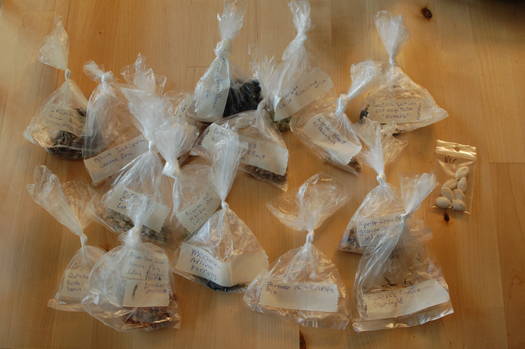A recent post on Ottawa Hortiphilia addresses a very important trend we should all be aware of, the commercializing of heirloom varieties in seed catalogs.
Until recently most seed retailers were prohibited by clauses in their suppliers contracts from identifying open pollinated (OP) and heirloom varieties for what they were. In effect what this meant if a retailer wanted to sell heirloom seed, and identify them as such, they could only sell heirloom seeds and only purchase them from a very limited number of suppliers. This is still the case for most small seed companies, and it makes selling heirloom varieties almost impossible to do profitably.
It’s a very small victory that there are now a few companies selling both heirloom and non heirloom seeds, and identifying them as such. We will probably see more in the coming years.
It’s very easy for seed companies to mislead you into purchasing seeds that you think are suitable for seed saving, but really aren’t. For example giving them descriptions along the lines of ‘just like what your grandmother grew’, or giving them a name close to but not exactly the same as a similar heirloom variety. These days many seed companies put a broad statement on the front of their catalog about carrying more heritage varieties than ever before, don’t identify what any of them are, but give you the feeling like you can trust the seeds you buy from them.
Anytime you buy seeds from a company that does not sell exclusively heirloom varieties, you are taking a risk of buying something that is not suitable for seed saving. In any event, never purchase anything that is not clearly labelled as being suitable for seed saving or OP.
It is clear that more heirloom and OP varieties will start becoming available from larger seed companies. As this starts to happen, it’s important we do not lose our small seed companies. It’s important the meaning of heirloom, heritage or OP varieties does not get lost or that we find ourselves back in the position of only being able to buy seeds from the large seed companies. It’s very important we all think about buying seeds from people and small companies we trust and not faceless corporations with clever marketing departments and colorful catalogs.
We need more OP varieties
There is another side of the coin here.
There are a large number of OP and heritage varieties stored away in seed banks around the world. It takes a lot of time and money to get these varieties out of the seed banks, and into gardens and production on farms. There is much more work involved than just taking the seeds out of the seed banks and growing them, they have to be selectively bred first. For a long time now seed companies have been putting their efforts into developing hybrid varieties and ignoring open pollinated ones.
By showing a preference for OP varieties when purchasing fruit and vegetables, as well as encouraging seed companies to produce new and interesting OP varieties, we can provide incentive for large seed companies to invest in developing more OP varieties.


